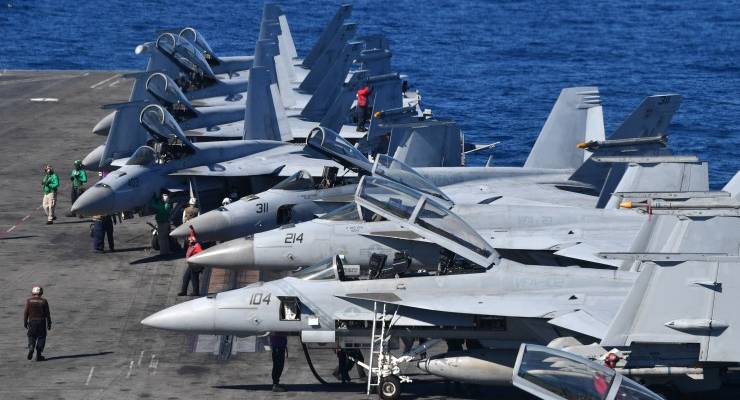
Fifteen and a half years after our enthusiastic support for the US-led military intervention in Iraq, we’re going back again. This time it’s with a ship, a plane and a couple of hundred personnel to join another coalition of the willing, this time Donald Trump and Boris Johnson’s armada targeting Iran.
Various names are being floated as other possible participants in the latest Coalition, without, one hopes, the embarrassment of being added by mistake. Of course, as the “forever war” dictates, we never really ended the Iraq venture. We’ve been training or bombing in Iraq ever since. We’ve spent over $1.3 billion since 2014 going after the direct result of our Iraq intervention, Islamic State — with the occasional, and of course highly regrettable, deaths of innocents.
Given the last venture spawned a new generation of terrorists, a short-lived terrorist state, a wave of attacks in Western and developing countries that cost hundreds of lives, dramatically strengthened the role of the Iranian regime in the region and led to the deaths of hundreds of thousands of Iraqis — it was only in 2013 that life expectancy for Iraqis returned to Saddam-era levels — not to mention costing trillions of dollars, the lack of reflection about the unintended consequences of another military intervention is remarkable.
Labor, under Simon Crean, had the fortitude to oppose the Iraq debacle from the outset; 2019 vintage Labor, having apparently decided the whole business of being an opposition is too hard, is on board from the outset, leaving only the Greens to oppose it and Centre Alliance’s Rex Patrick to point out that it “amounts to a blank cheque for Australian entanglement in any war with Iran”. Parliament is in recess so the commitment won’t even be debated.
In the absence here of a genuine diversity of informed conservative viewpoints of the kind that distinguishes commentary in the United States, it’s easy to fall into the trap of seeing Australia’s participation in another military venture through an ideological and partisan lens: that opposition to participating in Trump’s armada must be the province of the far left and adherents of anti-Americanism.
In fact, the strongest arguments against Australia joining yet another Middle East intervention are conservative ones:
- The US has caused the problem the armada is ostensibly designed to solve by abandoning an international agreement. Iran was in full compliance with the JCPOA until Trump, at the behest of a far-right Israeli government (with which the US is now training for Gulf military operations), walked away from the agreement and imposed draconian sanctions. Our participation in the armada rewards rule-breaking and violating international norms.
- The armada will escalate tensions and the likelihood of conflict, not — as Scott Morrison risibly claims — “de-escalate” them. Iran will be confronted with a fleet of vessels targeting it. More ships, more planes, more drones, more personnel will be crammed into an already tense region. Given the agenda of key Trump adviser John Bolton is conflict with Iran, the armada increases the likelihood that an “accident” or provocation leads to outright conflict.
- The armada will further strengthen the hand of Iranian hardliners who can point to yet another sign of Western aggression, at a time when US sanctions are killing children and impoverishing ordinary Iranians. Tehran hardliners and Washington hardliners like Bolton and Mike Pompeo have an alliance of interests in pushing each other closer and closer to conflict.
- It will increase the risk of terrorism aimed at Australians given it demonstrates — yet again — Australia’s willingness to participate in US military interventions aimed against Islamic countries. Our failure to condemn Trump’s lethal sanctions also reinforces the perception that Australia has a particular hostility to Muslim people in the Middle East.
- Far from keeping oil prices down, the armada, in the event if leads to a conflict with Iran, will see oil prices go as high as $150 a barrel, smashing Asian economies and slugging world growth. Claims that the armada was about keeping the sea lanes open so oil could flow might end up looking as foolish as Rupert Murdoch’s prediction the Iraq war would deliver $20 a barrel oil.
- As one ASPI critic noted, continuing to commit our limited military resources to US chest-beating in the Middle East is a distraction from our real priority: dealing with an aggressive China.
- It perpetuates the endless “War on Terror” that saddles Western economies and the US in particular with superfluous military expenditure, leading to higher taxes and protectionist defence industry policies and diverting resources and investment away from more productive uses in other sectors of the economy.
The strongest case against our infantile obsession with following the US into every misbegotten intervention is a conservative one, not a progressive or left-wing one. The silence on Australia’s latest venture from the right reflects poorly indeed on conservative intellectuals, or pretenders to that role.








Crikey is committed to hosting lively discussions. Help us keep the conversation useful, interesting and welcoming. We aim to publish comments quickly in the interest of promoting robust conversation, but we’re a small team and we deploy filters to protect against legal risk. Occasionally your comment may be held up while we review, but we’re working as fast as we can to keep the conversation rolling.
The Crikey comment section is members-only content. Please subscribe to leave a comment.
The Crikey comment section is members-only content. Please login to leave a comment.